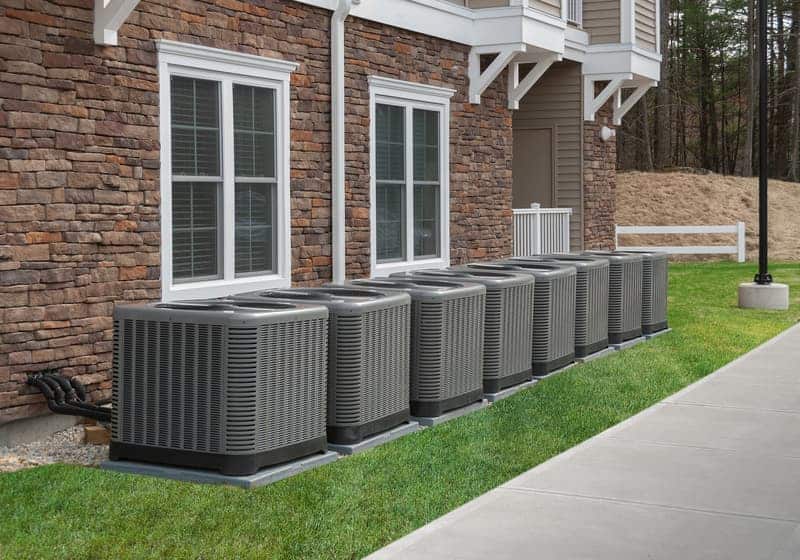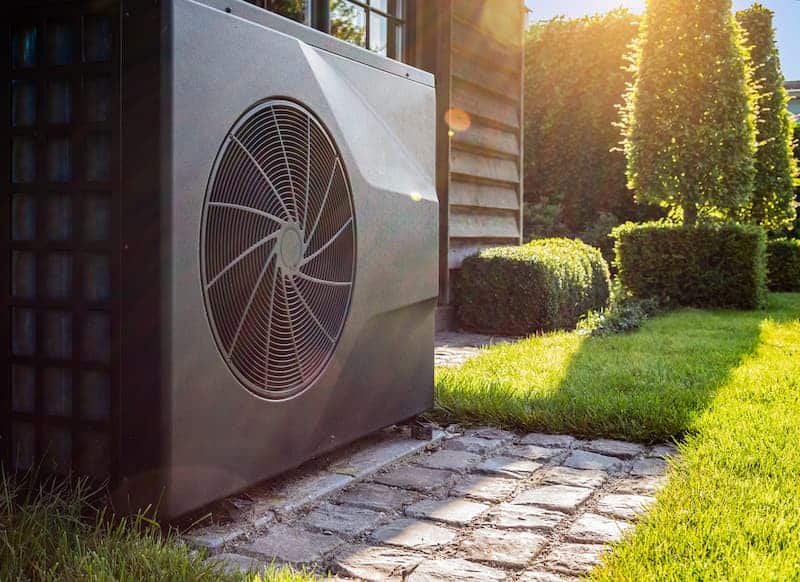Heat pumps have become a flexible and sustainable option for heating and cooling homes and businesses in the ever-changing field of energy-efficient technologies. A heat pump is an advanced device that transfers heat energy between spaces within and outside by applying the laws of thermodynamics. It offers cooling relief in the summer and warmth in the winter.
Unlike conventional heating systems that produce heat, a heat pump transfers existing heat. This makes heat pumps a more energy- and environmentally-friendly option. Let’s explore the specifics of heat pumps, including their functions, advantages for contemporary HVAC systems, and how they are made.
Read: Coal Ash: Composition & Environmental Impact
Definition of a Heat Pump
A heat pump is an electrically driven apparatus that efficiently transports heat from one location to another. This property allows the pump to cool areas if the direction of heat transfer is switched.
Heat can be taken out of cold air and transferred to warmer air, even though this may initially seem illogical. An outdoor heat pump is a component of a residential air conditioning and heating system. It may provide heat and cool your house, much like a central air conditioner.
A heat pump takes heat from the chilly exterior air into your home during the cooler months and removes heat during the warmer months to cool it. They use refrigerant to convey heat and are powered by electricity to be comfortable all year round.
It’s possible that homeowners won’t need to build independent systems to heat their houses because they manage both cooling and heating. An electric heat strip can be fitted to the interior fan coil for further functionality in colder climates. Heat pumps are more environmentally friendly than furnaces because they don’t burn fossil fuels.
How Does a Heat Pump Work?
The technology used by a heat pump is comparable to that of an air conditioner or refrigerator. It draws heat from an origin, such as the ambient air, ground-based geothermal energy, adjacent water sources, or waste heat from a plant. The heat is then amplified and directed where it is required.
Heat pumps are significantly more efficient than traditional heating technologies like boilers or electric heaters. They can be less expensive to operate because most heat passes through rather than generated. The energy output in the form of heat is typically many times more than the energy needed to power the heat pump, typically done with electricity.
Heat pumps can be used in hybrid arrangements with other heating systems, most often gas-powered ones. The actual heat pump comprises a heat exchanger that removes heat from the source and a compressor that cycles a refrigerant through a refrigeration cycle. After that, the heat is transferred to a heat sink via yet another heat exchanger.
In buildings, forced air or hydronic systems distribute heat, including under-floor heating or radiators. Heat pumps can be used in hydronic systems to give flexibility or to generate sanitary hot water when linked to a tank.
In addition to satisfying space heating needs in the winter, many heat pumps can offer space cooling in the summer. Heat pumps are used in industry to heat materials directly or to supply hot air, water, or steam.

Types of Heat Pumps
Heat pumps can be classified into three categories: ground source (geothermal), water source, and air source.
These three functions follow the same principles previously discussed but obtain heat from various sources.
Air Source Heat Pump
An air source heat pump, sometimes called an air-to-air pump, brings heat inside your house by drawing it from the outside air. This heat pump is among the cheapest and easiest to install, requiring minimal space.
In moderate regions, ductless heat pumps are more energy-efficient than conventional ground and water-sourced techniques; in frigid climates, they are less efficient than an earth source pump with a well-constructed ground loop. According to D.O.E. estimates, an air-source heat pump can contribute to a 50% reduction in energy use.
Ground Source Heat Pump
A geothermal heat pump, sometimes called a ground source heat pump, draws heat energy from the earth and dirt surrounding your foundation and uses it to warm your house.
Because the ground is nearly always warmer than the surrounding air during the winter, ground-source heat pumps are more effective than air-source heat pumps, particularly during the colder months.
Additionally, a geothermal heat pump is quieter and more dependable than an air source system. The primary reason for the lack of widespread adoption of geothermal heat pumps is their high installation costs.
Water Source Heat Pump
The latter alternative is only practical if a body of water, like a pond, is near your house or land. A water source heat pump removes heat energy from the water by directly pumping water through the heat pump.
Compared to air source pumps, this approach offers a more consistent input temperature and is far less expensive to install than ground source pumps. Water source heat pumps need a steady flow of water, and a backup heat source might be required in the dead of winter.

Applications of Heat Pump
Understanding the historical developments and operational nuances of heat pumps makes it simpler to completely comprehend the vast array of uses for which these engineering marvels are employed in the modern world.
Heat pumps have many applications, both commercial and residential, and they are essential to sustainable practices. New applications are constantly being explored and enhanced.
Paper Industry
Making paper releases a lot of carbon dioxide during manufacture. Heat pumps could contribute to achieving sustainability by reducing carbon emissions. Therefore, heat pumps can assist you in determining the concentration of black liquor, product drying, flash-steam recovery, and water heating if you are in the pulp, paper, or lumber production business.
Chemical Industry
The depletion of fossil fuels and the necessity to contribute to a sustainable future have made using heat pumps in the chemical sector a prominent topic in recent years. Heat pumps play a crucial role in the concentration of salt solutions and the treatment of the effluent process during the synthesis of chemical salts.
Food and Beverages
In the food business, heat pumps help save gas expenses. Heat pumps aid in beer brewing and the concentration of leftover beer in the food and beverage sector. Not only to concentrate leftover beer but also to concentrate dairy sector liquid goods. Heat pumps are an environmentally beneficial and cost-saving measure in the food and beverage sector.
Residential Heating and Cooling
Homes frequently employ heat pumps for both cooling and heating. In the winter, air-source heat pumps pull heat from the air outside to warm interior rooms; in the summer, they can do the opposite to offer cooling.
Advantages and Disadvantages of Heat Pump
Like any technology, heat pumps have disadvantages but can provide many benefits as an environmentally friendly, energy-efficient heating and cooling option. Let us examine the benefits and drawbacks associated with heat pumps.
Advantages of Heat Pumps
Save Costs on Fossil Fuels
By switching to a heat pump, you can heat your home more sustainably if a fossil fuel, such as gas, oil, or L.P.G., currently powers it. You will no longer have to purchase these fuels. As a result, you can rejoice that you won’t have to pay for gasoline anymore because your gas payments will stop.
Improved Safety and Eco-friendliness
Individuals who own gas furnaces are vulnerable to carbon monoxide poisoning and natural gas leaks. An electric heat pump is among the safest forms of HVAC equipment as it has no open flames or pollutants. Heat pumps are also more environmentally beneficial because they emit no emissions from fossil fuels.
Minimal Noise
One benefit of purchasing an electrical heat pump over a furnace or central air conditioning unit is that the former is made to run with the least amount of noise possible. At 60 dB, a typical air conditioner runs. Conversely, an energy-saving air source heat pump operates at 40 decibels. You should consider investing in a heat pump system if you’re trying to find a replacement for your outdated, noisy air conditioner.
Disadvantages of Heat Pumps
Increased Electricity Usage
Installing a heat pump will probably result in a rise in electricity usage since heat pumps require electricity to function. It is advised that householders contact their energy provider to inquire about the availability of a heat pump electricity tariff since this could be a more cost-effective and appropriate plan for an electric-powered renewable heating system.
Higher Installation Cost
Heat pumps are more expensive to buy and install than an equivalent air conditioner because they are more complicated. You might save money compared to replacing a furnace and air conditioner simultaneously.
Read: Smart Home: Components, Examples & Challenges
Uses a Small Amount of Carbon
Even though a heat pump doesn’t run on propane or natural gas, it isn’t carbon neutral because it uses a lot of electricity to supply warm and cold air to your house. The only way to remove the carbon emissions your system produces is to combine your heat pump using solar panels mounted on your lawn or your roof.
Conclusion
Heat pumps are regarded as eco-friendly because they can be more sustainable than conventional heating and cooling systems when fueled by electricity derived from renewable sources. Because of their adaptable design, which combines heating and cooling functions into a single unit, they are becoming increasingly well-liked in areas with moderate climates.






